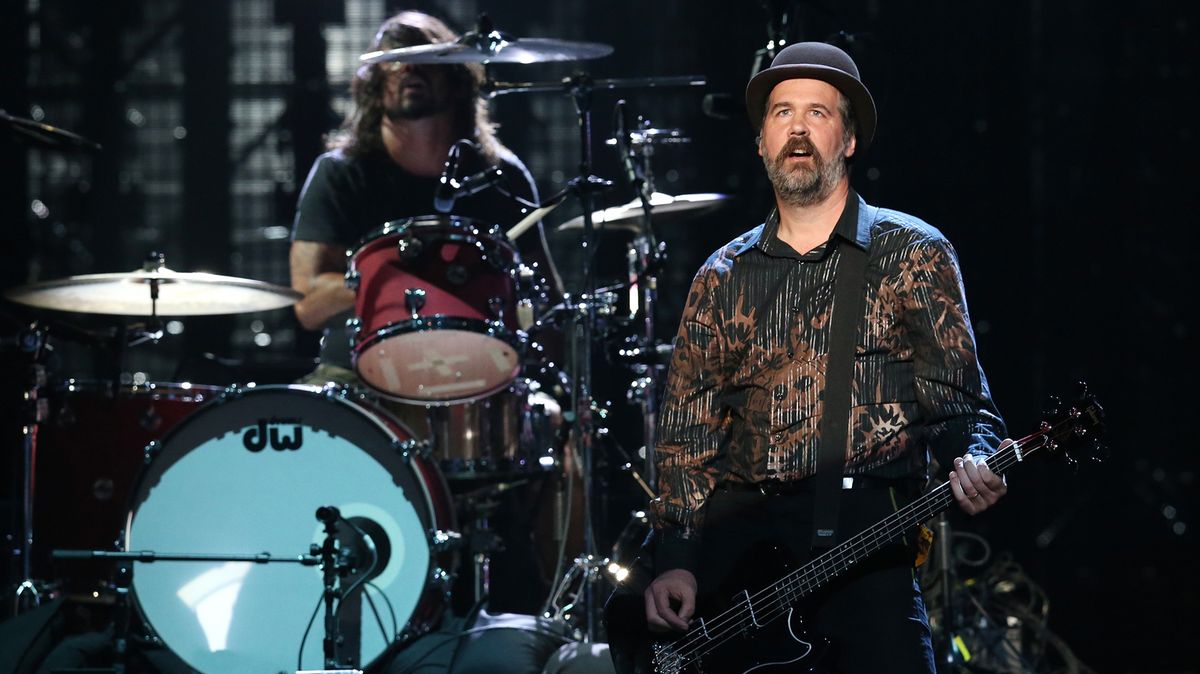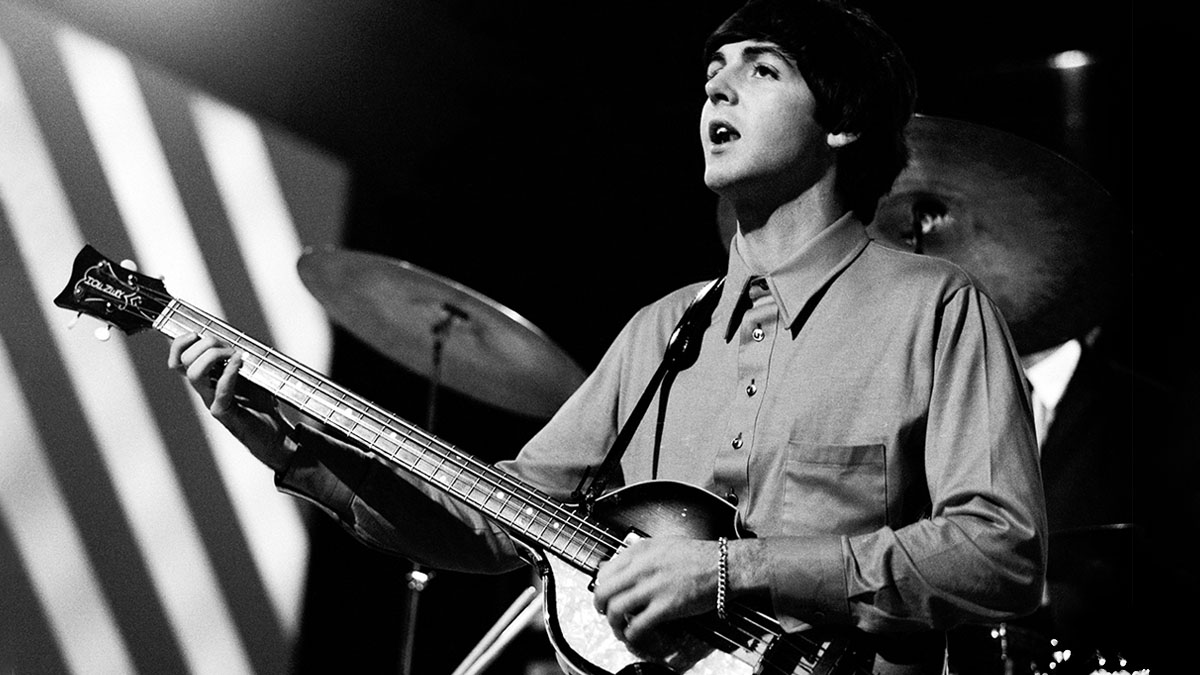Home>Instruments>Bass>What Bass Does Geezer Butler Play


Bass
What Bass Does Geezer Butler Play
Modified: January 22, 2024
Discover what type of bass Geezer Butler plays and learn more about his iconic sound with this in-depth guide.
(Many of the links in this article redirect to a specific reviewed product. Your purchase of these products through affiliate links helps to generate commission for AudioLover.com, at no extra cost. Learn more)
Table of Contents
Introduction
Geezer Butler is a legendary bassist known for his influential contributions to the world of heavy metal music. As the founding member and primary songwriter of the iconic band Black Sabbath, Butler has left an indelible mark on the genre with his driving bass lines and distinctive tone.
Born Terence Michael Joseph Butler on July 17, 1949, in Birmingham, England, Butler showed an early aptitude for music and began playing bass guitar in his teens. Influenced by the likes of John Entwistle of The Who and Jack Bruce of Cream, Butler developed a unique playing style and a deep understanding of the bass as a central component of a band’s sound.
Throughout his career, Geezer Butler has been praised for his ability to create melodic, yet aggressive basslines that help define the heaviness and power of Black Sabbath’s music. With his solid foundation and complex rhythms, Butler provides a backbone for the band’s iconic sound, blending blues, psychedelia, and dark lyrical themes into a form of music that would eventually be dubbed as heavy metal.
This article will explore the journey of Geezer Butler as a bassist, including his early influences, choice of bass, signature sound, equipment and gear, playing style and techniques, contributions to Black Sabbath, solo work, and his lasting impact on the world of bass playing.
Early Influences
Geezer Butler’s journey as a bassist was shaped by a variety of influences that helped him develop his unique playing style. Growing up in Birmingham, England during the 1960s, Butler was exposed to a diverse range of musical genres and artists.
One of his earliest influences was John Entwistle, the legendary bassist of The Who. Butler was captivated by Entwistle’s melodic approach to bass playing and his ability to stand out within a band’s sonic landscape. He admired Entwistle’s technical prowess and innovative use of the bass as a lead instrument.
Another significant influence on Butler was Jack Bruce of Cream. Bruce’s dynamic and expressive bass playing pushed boundaries and showcased the instrument’s melodic capabilities. Butler was drawn to Bruce’s ability to create intricate basslines that added depth and complexity to Cream’s music.
Butler also drew inspiration from the blues genre, which heavily influenced the sound of Black Sabbath. He admired the bass playing of blues legends such as Willie Dixon and Bill Wyman, who showcased the importance of a strong bass foundation in creating a distinctive and powerful sound.
Additionally, Butler was inspired by the dark and introspective lyricism of Bob Dylan and the poetic storytelling of Leonard Cohen. These influences would later shape the lyrical content of Black Sabbath’s music, intertwining with the heavy and ominous sound created by Butler’s basslines.
By combining these diverse influences, Butler forged his own unique approach to bass playing. He sought to blend melody, rhythm, and emotion in his basslines, creating a sound that would become a defining characteristic of Black Sabbath’s music.
Through his early influences, Geezer Butler found the inspiration and guidance to explore the potential of the bass guitar in ways that would ultimately revolutionize heavy metal music. In the following sections, we will delve further into his choice of bass, signature sound, equipment and gear, playing style and techniques, contributions to Black Sabbath, solo work, and his lasting impact on the world of bass playing.
Choice of Bass
Geezer Butler’s choice of bass played a crucial role in shaping his distinctive sound. From the early days of his career to his iconic work with Black Sabbath, Butler carefully selected instruments that could deliver the power and depth necessary for his playing style.
One of Butler’s most notable bass guitars is his signature Gibson SG bass. The SG bass is known for its solid construction and versatile tone, making it an ideal choice for a heavy metal bassist like Butler. With its dual humbucker pickups, the SG bass provides a rich and punchy sound that can cut through the mix while maintaining clarity and definition.
In addition to the Gibson SG, Butler has also played other bass models throughout his career, including the Fender Precision Bass. The Precision Bass is renowned for its deep, resonant tone and excellent sustain. Its thick and powerful sound helped Butler achieve the heavy, driving basslines that became a trademark of Black Sabbath’s music.
Butler’s choice of bass extended beyond just the brand and model. He also experimented with different string gauges and setups to achieve the desired feel and tone. Often opting for heavier gauge strings, Butler was able to produce a deep, booming sound that added weight and intensity to his basslines.
Furthermore, Butler’s choice of amplifiers and effects pedals played a significant role in shaping his bass tone. Throughout his career, he has used a variety of amplifiers, including the Ampeg SVT and Marshall stacks, to achieve the necessary power and projection for his playing style. Additionally, he utilized effects pedals such as the Electro-Harmonix Big Muff distortion pedal and the MXR Phase 90 to add texture and color to his bass sound.
By carefully selecting his instruments and gear, Geezer Butler was able to create a distinct bass tone that became synonymous with the heavy and atmospheric sound of Black Sabbath. His choice of bass not only complemented the genre-defining music but also allowed his playing style to shine through with clarity and impact.
In the following sections, we will delve into Butler’s signature sound, equipment and gear, playing style and techniques, contributions to Black Sabbath, solo work, and his lasting impact on the world of bass playing.
Signature Sound
Geezer Butler’s bass playing is characterized by a distinct and powerful sound that has become his signature. His ability to create memorable basslines that seamlessly integrate with the guitar riffs and drums is a testament to his musical prowess.
One of the defining elements of Butler’s signature sound is his use of heavy distortion on his bass. By incorporating distortion effects, he added a gritty and aggressive edge to his playing. This technique not only enhanced the heaviness of Black Sabbath’s music but also showcased Butler’s skills as a bassist who could hold his own amidst the wall of guitars.
Butler’s sense of melody is also a key component of his signature sound. Despite the heavy and intense nature of the music, he managed to infuse his basslines with melodic motifs and memorable hooks. This balance between power and melody is evident in songs like “Iron Man” and “N.I.B.”, where the basslines serve as catchy and integral parts of the overall composition.
The rhythm and groove that Butler brings to his bass playing is another aspect of his signature sound. His ability to lock in with the drummer and create a solid foundation for the music is unparalleled. Whether it’s the driving pulse of “Paranoid” or the hypnotic groove of “War Pigs,” Butler’s sense of timing and rhythmic feel elevates the impact of each song.
Additionally, Butler’s use of fills and techniques such as slides, bends, and hammer-ons showcases his versatility and adds depth to his basslines. These techniques help to create dynamic and expressive moments within the music, further enhancing the overall impact of his playing.
The tone that Butler achieves with his bass is a crucial element of his signature sound. His choice of instruments, such as the Gibson SG bass and Fender Precision Bass, combined with heavy gauge strings and amplifiers like the Ampeg SVT, contribute to his distinct and powerful tone. This tone cuts through the mix and creates a commanding presence in Black Sabbath’s music.
Overall, Geezer Butler’s signature sound is a combination of heavy distortion, melodic sensibility, rhythmic precision, and a powerful tone. His ability to craft basslines that balance aggression, melody, and groove has made him one of the most influential bassists in the world of heavy metal. Through his signature sound, Butler has left an enduring impact on the genre and continues to inspire bass players to this day.
In the following sections, we will explore Butler’s equipment and gear, playing style and techniques, contributions to Black Sabbath, solo work, and his lasting legacy as one of the greatest bassists in the history of rock music.
Equipment and Gear
Geezer Butler’s choice of equipment and gear has played a significant role in shaping his iconic bass sound. From his bass guitars to amplifiers and effects, each component has been carefully selected to achieve the desired tone and performance.
One of Butler’s most recognizable instruments is his signature Gibson SG bass. Featuring a solid mahogany body and neck, the SG bass offers a warm and rich tone that blends well with heavy distortion. The dual humbucker pickups on the SG bass provide a powerful and punchy sound, allowing Butler to cut through the mix and make his presence known.
In addition to the Gibson SG, Butler has also been known to use Fender Precision Bass guitars. The Precision Bass is renowned for its deep and resonant tone, making it a perfect choice for the heavy and thunderous sound of Black Sabbath. With its thick and powerful sound, the Precision Bass adds weight and intensity to Butler’s basslines.
When it comes to amplifiers, Butler has favored brands such as Ampeg and Marshall. One of his go-to setups includes the legendary Ampeg SVT (Super Valve Technology) amplifier, known for its massive power and full-bodied tone. The SVT allows Butler to achieve the necessary projection and low-end presence that complements the heavy nature of Black Sabbath’s music.
To shape and sculpt his bass tone, Butler has incorporated various effects pedals into his setup. One of his most prominent pedals is the Electro-Harmonix Big Muff distortion pedal. The Big Muff provides a rich, thick distortion that adds grit and aggression to his bass sound. Butler has also employed the MXR Phase 90 pedal to add a swirling and psychedelic modulation to his playing.
Furthermore, Butler’s choice of strings and setup preferences contributes to his unique sound. He often opts for heavier gauge strings, such as .050-.110, to achieve a deep and booming low end. This, combined with his meticulous setup adjustments, allows him to attain the perfect balance between playability and tone.
Overall, Geezer Butler’s equipment and gear reflect his attention to detail and his commitment to achieving the ideal bass sound. From his signature Gibson SG bass to his choice of amplifiers, effects pedals, and string preferences, each component has been carefully chosen to create a powerful and distinctive bass tone.
In the following sections, we will explore Butler’s playing style and techniques, his contributions to Black Sabbath, his solo work, and his enduring impact on the world of bass playing.
Playing Style and Techniques
Geezer Butler’s playing style and techniques have had a profound influence on the world of bass playing, solidifying his status as one of the greatest bassists in rock music. Known for his powerful and melodic approach, Butler’s playing perfectly complements the heavy and dark sound of Black Sabbath.
One aspect of Butler’s playing style is his impeccable sense of rhythm and groove. He has the ability to lock in with the drummer, creating a solid and tight foundation for the music. His mastery of timing and syncopation adds depth and complexity to Black Sabbath’s compositions, enhancing the overall impact of the band’s sound.
In terms of technique, Butler is known for his use of slides, bends, hammer-ons, and pull-offs to add flair and expressiveness to his basslines. These techniques are showcased in songs like “N.I.B.” and “Children of the Grave,” where Butler’s agile and fluid playing elevates the dynamics of the music.
Although primarily a player of bass guitar, Butler has also incorporated elements of lead guitar playing into his style. His ability to play melodic and intricate bass solos, such as in songs like “N.I.B.” and “Black Sabbath,” adds a unique dimension to his playing and showcases his versatility as a musician.
Butler’s songwriting abilities have greatly contributed to the impact of his playing style. He has a knack for crafting memorable basslines that seamlessly intertwine with the guitar riffs, creating a cohesive and powerful sound. His melodic sensibility shines through in songs like “War Pigs” and “Heaven and Hell,” where the basslines serve as melodic hooks that enhance the overall catchiness of the music.
Another defining aspect of Butler’s playing style is his use of heavy distortion on his bass. By incorporating distortion effects, he created a distorted and aggressive sound that set him apart from other bassists of his time. This use of distortion added an edge and intensity to his playing, further contributing to the heaviness of Black Sabbath’s music.
Overall, Geezer Butler’s playing style and techniques encompass a wide range of skills that showcase his mastery of the bass guitar. From his impeccable sense of rhythm and groove to his use of slides, bends, and melodic solos, his playing is a perfect complement to the heavy and atmospheric sound of Black Sabbath. By pushing the boundaries of what a bass guitar can do, Butler has left an indelible mark on the world of bass playing.
In the following sections, we will explore Butler’s contributions to Black Sabbath, his solo work, and his lasting impact on the world of bass playing.
Contributions to Black Sabbath
Geezer Butler’s contributions to Black Sabbath, both as a bassist and as a songwriter, are immeasurable. As a founding member of the band, his powerful basslines and thought-provoking lyrics played a crucial role in shaping the sound and identity of one of the most influential heavy metal bands of all time.
Butler’s bass playing in Black Sabbath can be best described as a driving force behind the band’s heavy sound. His deep, resonant tone and precise playing provided a solid foundation for the music, allowing Tony Iommi’s guitar and the rhythm section to soar. His melodic sensibilities shone through in iconic basslines of songs like “Paranoid,” “Sweet Leaf,” and “Iron Man,” adding a memorable and melodic element to Black Sabbath’s music.
Butler’s songwriting contributions to Black Sabbath cannot be overstated. His ability to combine dark, introspective lyrics with heavy, riff-driven compositions helped define the band’s sound and set them apart from their contemporaries. Songs like “War Pigs,” “N.I.B.,” and “Hand of Doom” exemplify Butler’s lyrical prowess, tackling themes of war, society, and the human condition.
One of Butler’s notable contributions to Black Sabbath was his exploration of religious and occult themes in their music. Songs like “Black Sabbath” and “Children of the Grave” delved into darker subject matter, reflecting the band’s interest in the occult and their desire to push the boundaries of rock music. Butler’s lyrical and thematic choices added depth and an air of mystery to their music.
Additionally, Butler’s bass playing and songwriting helped shape the overall structure and dynamics of Black Sabbath’s songs. His ability to create contrasting sections within a song, transitioning from slow and brooding passages to fast and aggressive sections, added a sense of tension and emotional depth to their music. This approach can be heard in tracks like “Sabbath Bloody Sabbath” and “Symptom of the Universe.”
Throughout their career, Butler’s contributions to Black Sabbath extended beyond the basslines and lyrics. He played an active role in the creative process, collaborating with the band members to craft the distinct sound and atmosphere that became the hallmark of Black Sabbath’s music.
Geezer Butler’s contributions to Black Sabbath have had a lasting impact on the world of heavy metal. His masterful bass playing, thought-provoking lyrics, and inventive songwriting have influenced countless musicians, setting a benchmark for the genre. He continues to be recognized as a pioneering force in heavy metal and remains an inspiration to aspiring bassists and songwriters.
In the following sections, we will explore Butler’s solo work, his legacy, and his enduring impact on the world of bass playing.
Solo Work
Outside of his work with Black Sabbath, Geezer Butler has also made notable contributions as a solo artist. His solo career allowed him the freedom to explore different musical styles and showcase his talents as a bassist, songwriter, and vocalist.
In 1985, Butler released his first solo album, “Plastic Planet,” under the moniker GZR. The album showcased a heavier and more aggressive sound, reminiscent of his work with Black Sabbath. Butler’s bass playing took center stage, driving the songs with powerful and intricate basslines. The album also featured his distinctive vocals, delivering lyrics that touched on themes of societal issues and personal struggles.
Butler’s second solo release, “Black Science,” came in 1997. The album expanded on the heavy sound established in “Plastic Planet,” incorporating elements of alternative and industrial metal. It showcased Butler’s versatility as a musician, with his bass playing ranging from thunderous and crushing to melodic and emotive. His songwriting continued to delve into introspective and thought-provoking subjects, displaying his lyrical finesse.
In 2005, Butler released his third solo album, “Ohmwork.” This album saw him teaming up with former Ozzy Osbourne guitarist Gus G and drummer Clive Burr. The sound of “Ohmwork” took a more melodic and traditional hard rock approach, allowing Butler to explore different sonic territories while maintaining his signature bass-heavy sound. The album received critical acclaim, with many praising Butler’s skillful bass playing and catchy songwriting.
Throughout his solo career, Butler has also collaborated with other artists, further expanding his musical horizons. He has worked with musicians such as guitarist John 5 and vocalist Burton C. Bell, demonstrating his ability to adapt and create compelling music in various contexts.
While his solo output may not have achieved the same level of commercial success as his work with Black Sabbath, Geezer Butler’s solo career has showcased his immense talent as a musician. His solo albums have allowed him to explore different genres and experiment with his sound, while still maintaining the powerful and melodic elements that have defined his playing throughout his career.
In the following sections, we will delve into Butler’s lasting legacy and his enduring impact on the world of bass playing.
Legacy and Impact
Geezer Butler’s legacy as a bassist and songwriter is one that continues to resonate within the world of rock and heavy metal music. His innovative playing style, powerful basslines, and thought-provoking lyrics have left an indelible mark on the genre and have influenced countless musicians.
As a member of Black Sabbath, Butler helped create the blueprint for heavy metal. His thunderous bass playing and dark lyrical themes became synonymous with the band’s sound and established a new standard for heavy music. Black Sabbath’s iconic albums, such as “Paranoid” and “Master of Reality,” with Butler’s creative contributions, laid the groundwork for generations of metal bands to come.
Butler’s ability to meld melody and aggression in his basslines has set him apart from his peers. His melodic sensibility has not only influenced other bass players but has also contributed to the overall songwriting dynamics of Black Sabbath. His mastery of rhythm and groove has solidified him as one of rock music’s most influential bassists.
Beyond his technical prowess, Butler’s lyrical themes and contributions have resonated deeply with fans. His exploration of dark, philosophical, and societal issues added depth and substance to Black Sabbath’s music. The band’s ability to convey both personal struggles and critical social commentary through their music connected with a wide audience and helped shape the identity of heavy metal as a genre.
In addition to his work with Black Sabbath, Butler’s solo career has further showcased his versatility as a musician. His solo albums, with their heavy and melodic sound, have demonstrated his ongoing creativity and ability to evolve as an artist.
Butler’s impact extends beyond his own music. His influence on subsequent generations of bass players is undeniable. His innovative playing techniques, use of distortion, and ability to create memorable basslines have been emulated by aspiring musicians around the world.
Furthermore, Black Sabbath’s music, with Butler’s contributions, has left an enduring legacy in popular culture. The band’s dark and heavy sound has transcended generations, shaping the landscape of rock and heavy metal and paving the way for countless bands and artists to follow.
In recognition of his groundbreaking work, Geezer Butler has received numerous awards and accolades, including induction into the Rock and Roll Hall of Fame as a member of Black Sabbath.
As a bassist, songwriter, and visionary, Geezer Butler’s legacy and impact on rock and heavy metal music are undeniable. His contributions to Black Sabbath, his solo career, and his influence on subsequent generations of musicians have solidified his place as one of the genre’s true pioneers. His powerful basslines and introspective lyrics continue to resonate with fans and inspire aspiring musicians, ensuring that his legacy will endure for years to come.
Conclusion
Geezer Butler’s journey as a bassist has been nothing short of extraordinary. From his early influences to his signature sound, his contributions to Black Sabbath and his solo work, Butler has left an indelible mark on the world of rock and heavy metal music.
Throughout his career, Butler showcased his mastery of the bass guitar, combining power and melody to create impactful and memorable basslines. His playing style, rooted in rhythm and groove, set him apart from others, with his ability to lock in with the drummer and create a solid foundation for the music.
Butler’s choice of equipment and gear, including his iconic Gibson SG bass and Ampeg SVT amplifier, played a crucial role in shaping his distinctive sound. The blending of heavy distortion, melodic sensibility, and a powerful tone became his signature and contributed to the heaviness and depth of Black Sabbath’s music.
As a songwriter, Butler’s lyrical themes delved into darkness and introspection, addressing societal issues and personal struggles. His ability to combine thought-provoking lyrics with heavy riffs elevated Black Sabbath’s music to a new level of sophistication and resonance.
Geezer Butler’s legacy and impact on the world of bass playing are immeasurable. His unique playing style, innovative techniques, and powerful songwriting have influenced countless musicians and continue to inspire aspiring bassists today.
As a founding member of Black Sabbath, Butler helped shape the genre of heavy metal, creating a sound that has stood the test of time. His contributions to iconic albums and his solo work have left an enduring mark on rock music, solidifying his place as one of the greatest bassists in the history of the genre.
While his career with Black Sabbath may be the highlight of his musical journey, Butler’s solo albums have further showcased his versatility and creativity as an artist.
In conclusion, Geezer Butler’s impact as a bassist, songwriter, and visionary cannot be overstated. His powerful and melodic basslines, thought-provoking lyrics, and immense influence have made him a true legend in the world of rock music. His legacy will continue to inspire and resonate with fans and musicians alike for generations to come.











